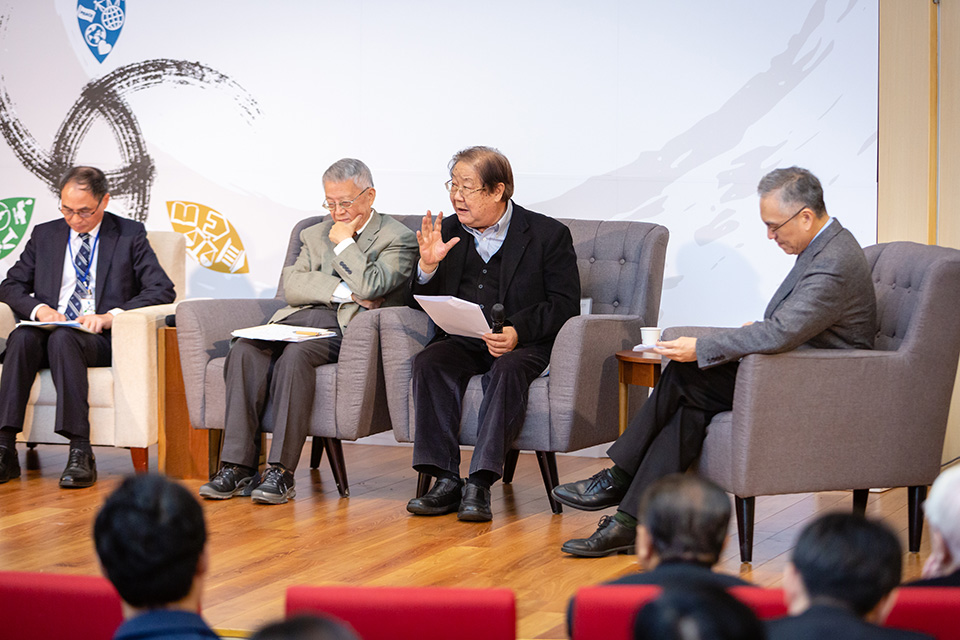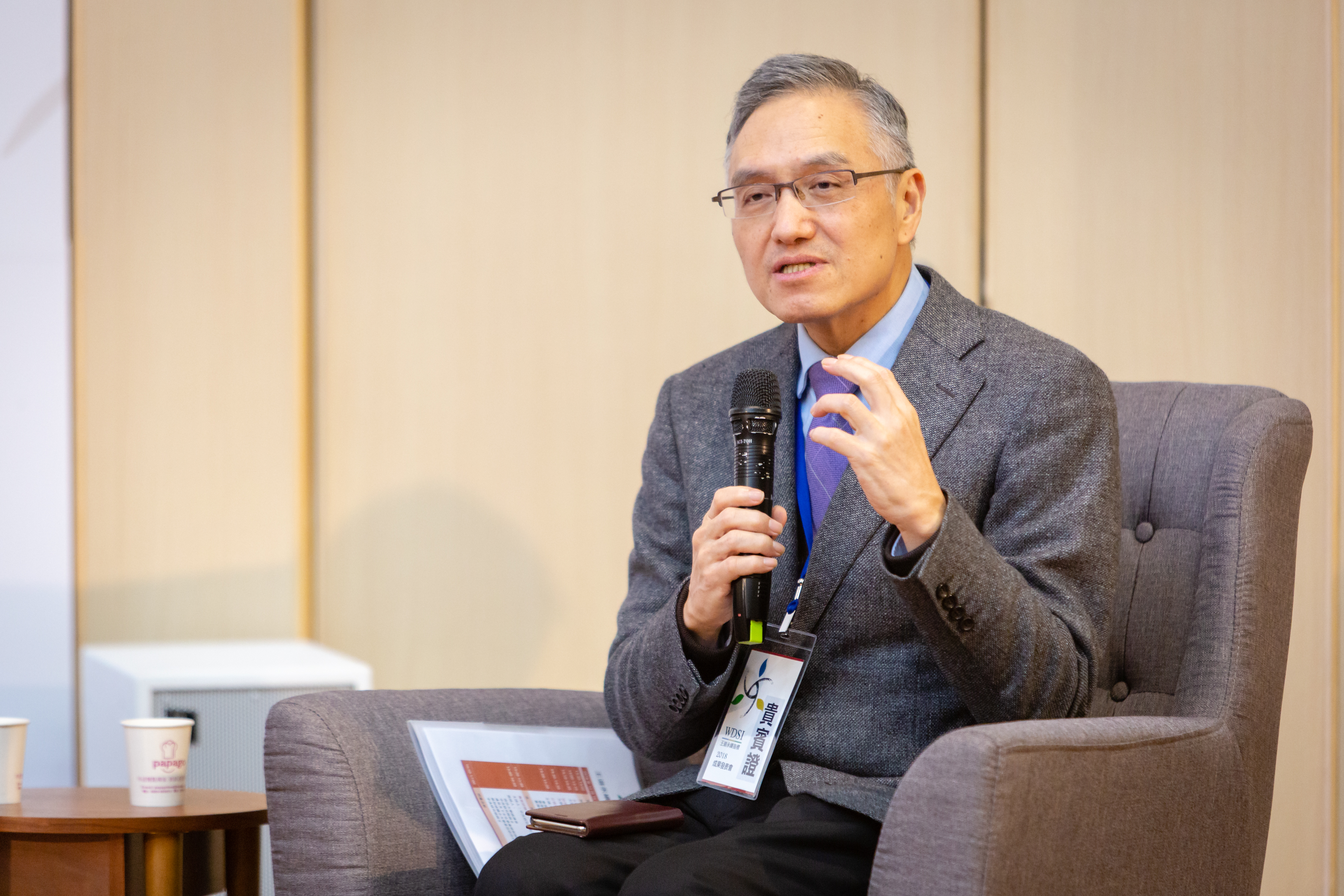
Panelist
Mr. Ambrose Yeo-chi King,
Academician, Academia Sinica; former President, Chinese University of Hong Kong
I would like to address the topic from 3 perspectives, that of the 3 W's: what, why, and how. First, what exactly is the Wang Dao Sustainability Index (WDSI)? Second, why launch the WDSI, when the United Nations (UN) already has something similar? What does WDSI bring to the table? Third, how do we push for wider adoption of the WDSI?
What is the WDSI?
The first perspective sees WDSI as being rooted in the precepts of Wang Dao. Ideologies are created when concepts rise to the level of rational discourse. Reason is a key part of ideology. How should we characterize the ideology of Wang Dao? Your research team identified 5 core elements, but the logic of the 5 elements within themselves and in relation to Wang Dao must be rigorously maintained. Since "kindness is inherent in the man”, according to Mencius, I recommend using the term “humanism” in place of “people-orientedness”. Using the 5 elements, you define the 3 domains, which I notice is adapted from the 3 pillars of sustainability established in ensuing discussions on the Brundtland Report. From there you have the 11 dimensions and finally the 64 actual indices.
This progression is simple to describe, but its execution is complex. In Professor Chu’s opening talk we saw a dimension called "external peace", which provokes the thought, are all wars bad for the score? In Wang Dao thought, the Tang and Wu revolution “took over” the reign of their past dynasties in the name of heaven in so called mandate war. It would be like going to war under the UN Charter, conforming perhaps to Wang Dao principles rather than being an unwarranted hostility. I shudder when I hear the word “jihad”, but you can't say it's not in accord with the beliefs of Islam at a higher level. Without going into the motivations of war, the pain and suffering is real, so are we to base the scores on numbers of lives lost?
Next, we have why. Why create the Index?
Here I continue picking out conflicting statements in the report. First, WDSI is not the first index built on culture as claimed. Both the UN's Sustainable Development Goals Index (SDGI) and the Foundation’s (FCCSD’s) WDSI are built on culture. The difference lies in the UN’s western point of view assuming conformity of other cultures, while the latter acknowledges diversity and differences of cultures. Second, your report claims that western civilization and capitalism has reached a bottleneck, and yet Western European countries rank highest on your list. So in your critique against the English/American neo-liberism and capitalism, your words have overreached. The scope should be confined to the argument, not the whole of western culture. Furthermore, WDSI aims to acknowledge nations in all stages of development, but it is at odds with the global reality, trying to measure differences when developed and developing countries already lie at opposite ends of the scale. Take the US and PRC, for example. All development that took place in mainland China since the Cultural Revolution can be regarded as progress in eradicating extreme poverty and undernourishment, which are accounted for in corresponding indicators, whereas in the US, they have developed well beyond this stage and thus have little to show on this front. How these indicators are assigned and weighted requires tremendous care.
Otherwise, I highly support your stance on equality. The 20th century's main ideologies are capitalism and socialism, with the latter emphasizing distribution. But taken to the extreme, it may affect production, leading to major events such as the Cultural Revolution. Yet, benefits of equal distribution actually register in WDSI, reflected in the post-Communist nations’ positive scores. This is proof of the WDSI's unique contribution to the field. However, you attribute the scores of these countries to their political system, which you call "social democracy". I strongly urge your team to call it "democratic socialism" instead, such as they have in the Nordic states.
Let's talk ethics. The UN has many discussions on "Global Ethics", on how to shape a moral social world, which I suggest looking deeply into. Our Chinese Confucian thought centers around the goal to establish ethical and moral order between man, society, and, in extension, the entire world. Global ethics play an important role in how Wang Dao works in society. I suggest the organizers to talk about what kind of sustainability you seek, by not just talking about sustainability goals, but rather what it means to have Wang Dao in sustainable thinking.
Lastly, I'll talk about the "how".
Regardless of the effectiveness and impact of the UN nowadays, it is after all, the mainstream. The high correlation between WDSI and SDGI as seen in the scorecard is an affirmation of Wang Dao. But rather than posing as an alternative viewpoint and solution, it is my suggestion that you should seek to work within the existing UN framework, incorporating Wang Dao thinking and its contributions into the mainstream SDGI.
I have one last suggestion, and that is all discourse should strive to be objective, demonstrating inclusiveness and workability from its elucidation to implementation. I see that Singapore didn't score so well compared to the US and the UK, so you should be prepared to answer for that!

Moderator
Dr. Yun-han Chu
Academician, Academia Sinica; Professor, Dept. of Political Science, National Taiwan University; President, Chiang Ching-kuo Foundation for International Scholarly Exchange
Thank you, the main factor in Singapore's standing is missing data. Much of the statistics are not released by the government, and data transparency is an issue. It didn't satisfy our threshold for data points but in the end we still put them in, substituting median values for the missing data, which dragged down its score. But yes, this is a technical issue which we need to clarify in the footnotes.